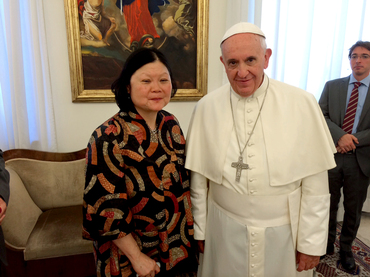By Dr. Carolyn Y. Woo
Dr. Carolyn Y. Woo is President and CEO of Catholic Relief Services. She was among those at the Vatican on June 18 speaking at the release of Pope Francis' encyclical on the environment, "Laudato Si; on the care of our common home."
Pope Francis asks us a very simple question in his encyclical: "What kind of world do we want to leave to those who come after us, to children who are now growing up?"
Surely this question resonates with almost everyone. It resonates with me as a mother and as someone who draws on business as a partner to eliminate poverty and as an educator of business practitioners. It is from the perspective of business that I speak today.
Pope Francis poses other questions: "What is the purpose of our life in this world? Why are we here? What is the goal of our work and all our efforts?" Those answer are akin to the mission and vision statements businesses formulate to define themselves, to gain legitimacy from society, commitment from employees, and support from customers.
As businesses strive to find those answers, they should realize that the message of this encyclical to the business world is a profoundly hopeful one. It sees the potential of business as a force for good whose actions can serve to mitigate and stop the cumulative, compounding, catastrophic effects of climate change driven by human actions.
One of the principal themes in this encyclical is that all life on this planet is bound together via three fundamental and intertwined relationships: with God, our neighbors and the earth. When one of these relationships is damaged, then the others are, too. So there is a connection between how we treat the planet and how we treat the poor, our neighbors. As Pope Francis puts it, we do not have two separate crises, social and economic, but "one complex crisis which is both social and environmental."
We have not treated our common home well. When it comes to the earth, we should think of ourselves as stewards rather than owners--tenants of God, as it were. The encyclical refers to the concept of the "global commons," the tangible and intangible assets that belong to all of human kind across all generations -- water, air, biodiversity, culture, genetic materials. And the pope rightly notes that business interests have too often been unkind to these ecosystems.
What we must undergo, the pope tells us, is a true "ecological conversion" involving business adopting the virtues of solidarity and sustainability, oriented toward the common good and the true development of all peoples. This has a number of practical dimensions.
It means abandoning absolute faith in market forces and technological advances. It means focusing on job creation as business's greatest responsibility. It means accounting for all costs of production, making the advancement of people and care for the planet challenge the primacy of short term profits. As the pope says, "to stop investing in people, in order to gain short-term financial gain, is bad business for society." I would add, it's bad for business, too!
Business must focus on sustainable development that can help pay the "ecological debt" that exists between developed and developing countries. And business should recognize that investing in sustainability is a "win-win" opportunity. As Pope Francis says, "efforts to promote a sustainable use of natural resources are not a waste of money, but rather an investment capable of providing other economic benefits in the medium term."
A human-centered approach based on principles of inclusive development can create better economic growth that benefits the many, not just the few; growth that strengthens local communities and builds resilience; growth that increases substantive freedoms and aids human flourishing.
It is the job of business to respond to customers and investors who are holding business to a higher standard, who want business to be ethical and to practice sustainability, with actions that are more than what Pope Francis calls mere "marketing and image-enhancing measures".
Let me make one final point. While affirming the important role that business will need to play, Pope Francis is clear that we need partnerships between public and private sectors. Sometimes that means business accepting stronger forms of regulation, especially in the financial sector.
Business is a human enterprise and must strive for true human development and the common good. In the years ahead, the challenges will be large. How can we develop technologies that will move us to a zero-carbon economy? How can we boost living standards of the developing world in a sustainable way? How can we make sure all have access to nutrition, energy, healthcare and education?
We can face up to these challenges by working together--governments, international institutions, businesses, NGOS, and religions --- with forthright and honest debate and dialogue that begins in the call to ecological conversation outlined so clearly in this great encyclical.
"What kind of world do we want to leave to our children?" If we stay focused on that question, we will stay on the right path.

